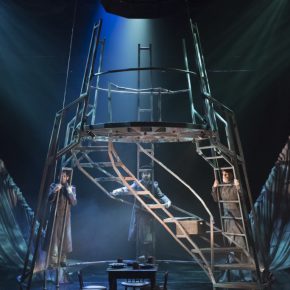THE CRY OF THE BEAST
A review by Christopher Bernard

Opera Parallèle presents a new production of Peter Maxwell Davies “The Lighthouse.” From left to right: Thomas Glenn, David Cushing and Robert Orth. At Z Space on Thursday night, April 28, 2016.
The Lighthouse
An opera written and composed by Peter Maxwell Davies
Produced by Opera Parallèle
Z Space
San Francisco
April 29 – May 1, 2016
The Grim Reaper’s over-exercised blade this year – which has seen the loss of so many figures from popular culture, from David Bowie to Merle Haggard, from Patty Duke to Alan Rickman – has not spared high culture. The Hungarian writer and Nobel laureate (and Holocaust witness and survivor) Imre Kertesz died this spring, and also Sir Peter Maxwell Davies, arguably – or rather, inarguably – Great Britain’s most significant composer since the death of Benjamin Britten.
By coincidence, serendipity or synchronicity, Opera Parallèle (San Francisco’s production company of modern opera), was preparing a new production of Davies’ most popular dramatic work. And the fine results, a triumph of talent over budget, were on view this spring over a handful of performances in San Francisco’s Z Space at Theater Artaud. These were dedicated to his memory, and it’s a great shame he didn’t live to see them: I think it’s fair to say he would have been more than happy, not only from the point of view of musical integrity and skill, but also of inventive and satisfying staging.
“Modern opera” sits uneasily next to the word “popular” – if anything, the terms would seem to imply a contradiction: the intellectual complexity, demands on the spectator’s musical background and attention, the refusal to make things easy for the rest of us, of musical theater written according to the fractured expressionism and radical musical innovations of 20th century modernism would seem to make “popularity” neither desirable nor even possible. And yet, The Lighthouse shows that, within a certain limited sphere, in the right hands of librettist and composer (in this case, surprisingly, both are the same person: in such cases, usually the opera suffers from an imbalance of talents, but not here), it is more than possible. Poe meets Conrad meets Schoenberg (figuratively speaking): popularity and high seriousness could hardly be better joined.
Davies’ spell-binding little morality tale cum operatic horror story is based on a wonderfully suggestive premise, a Marie Celeste−like enigma torn from the headlines of the winter of 1900, when three keepers of a lighthouse off the northernmost coast of Scotland disappeared (in the composer’s words) “into thin air,” leaving behind the remnants of a meal, overturned furniture, and other signs of hasty departure overrun by an army of starved rats.
The incident happened on the Flannan Islands not far from the remote Orkney Islands, where the composer himself lived for most of his adult life. In his one-act libretto, Davies used, and personalized, the incident to explore themes he had been pursuing in his work since the 1960s: themes of guilt and retribution, the polymorphous temptations of evil, the dangerous truths of religion and their distortion into hypocrisy and murderous destructiveness. He explores these themes also in the music he composed, music based on his rebarbative personal harmonic style but also including his wit, his gift for musical painting (as colorful as Richard Strauss’s, if more abstract), a poignantly distorted lyricism, and a talent for pastiche and musical satire, including an ability to create faux folk songs, popular tunes and low-church hymns of surpassing brilliance and humor. Davies’ feeling for the ludicrousness, the endless self-deceptions, of human motivation, goes quite as deep as his sense of its tragic short-sightedness; yet underneath and sustaining all of this is a profound and clear-eyed humanity.
The opera is divided into two sections: a prologue in which the three lighthouse inspectors who discovered the disappearance are questioned at an “enquiry,” and a long following act, called “The Cry of the Beast,” in which Davies imagines what may have actually happened to the three unfortunate keepers, the three singers doubling their roles.
These roles, demanding and highly varied, were handled with panache by Robert Orth (who has sung in earlier productions of the opera, and so brought an easy command of its requirements), the ringing bass of David Cushing, and Thomas Glenn, a singer gifted with a fine tenor voice who was still becoming comfortable in the role of Sandy, the hapless, romantic peacemaker among the keepers, between the bloody-minded cynic Blazes and the self-righteous bully Arthur.
The chamber orchestra rose energetically to the score’s challenges, and the conducting of Nicole Paiement (the company’s tireless artistic director, who, having led the opera in Dallas in 2012, displayed graceful control of a demanding score) was tight, finely paced and handsomely shaped. The staging used an ominous open-work skeleton of the lighthouse itself, set at the top with a commanding light sweeping the sea of the theater like a threatening eye, with great sails of transparent green and blue cloth handled by a quartet of black-costumed figures to create a spectral seascape of wind and fog and waves, of storm-tossed ravens, of the ghosts of guilty memories rising from the deep, and of the climactic Beast of the keepers’ fatal imaginings.
The mournful call of the enquiry’s inquisitor, of the foghorn and of the Beast, was the contribution of French hornist Susan Vollmer, who received well-deserved special recognition. Brian Staufenbiel directed with an iron hand in a velvet glove.
_____
Christopher Bernard is author of the novel Voyage to a Phantom City, the play The Beast and Mr. James, Dangerous Stories for Boys and The Rose Shipwreck: Poems and Photographs. He is also co-editor of Caveat Lector.

Pingback: Synchronized Chaos June 2016: Reality and Wishful Thinking | Synchronized Chaos